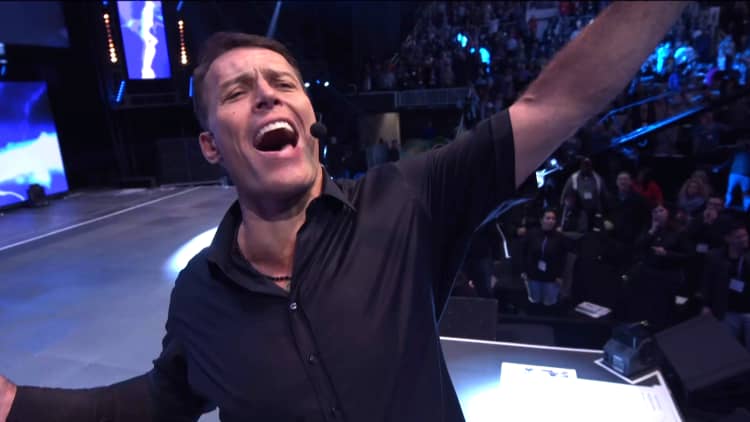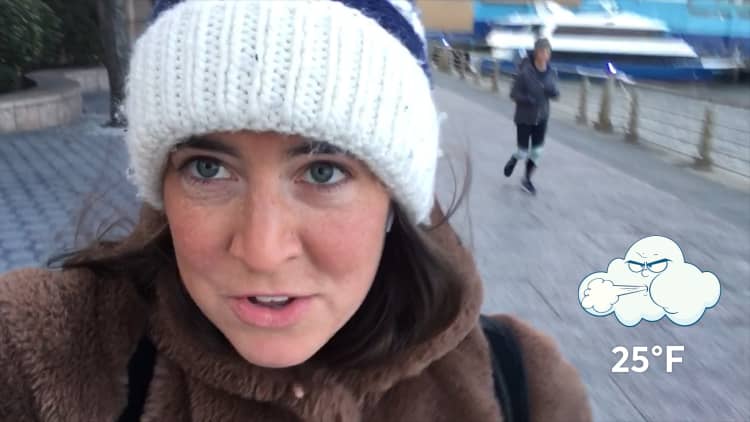The ancient philosophy of Stoicism – which teaches to be satisfied with what you have and includes practices like self-denial — has become a trend among Silicon Valley elites. But perhaps no one is more devoted than 42-year-old billionaire Jack Dorsey, CEO of Twitter and Square.
Dorsey tweets about his various Stoic endeavors, for which he is often derided: When he went on a 10-day meditation retreat in Myanmar for his birthday in 2018, he was blasted for being blind to the human rights atrocities occurring there. He's also been criticized for promoting questionable eating habits, like intermittent fasting.
But Dorsey says he needs to be "performant" and "clear" to effectively run two companies. So to maximize his capacity, he constantly evolves his habits, he says on the Ben Greenfield Fitness: Diet, Fat Loss and Performance podcast. Here's what Dorsey says he does.
1. Meditating twice a day
"The biggest impact" to his mental health is meditation, Dorsey tells Greenfield, adding that he has been practicing for 20 years.
Dorsey says he aims to meditate one hour in the morning and at night: "I've more or less kept up the practice of two hours ... a day," but "if you can just get 10 minutes, and sometimes that's all I can find, that's what I do."
In addition to the Myanmar meditation retreat, Dorsey says he did another one near Dallas.
I did my meditation at Dhamma Mahimã in Pyin Oo Lwin.
Meditation has been shown to have numerous benefits including decreasing stress, anxiety and depression and increasing focus and the ability to multitask.
2. Walking to work
For two years, rain or shine, Dorsey says he has walked the five miles from his home to his office in one hour and 15 minutes.
"I might look a little bit more like I'm jogging than I'm walking," Dorsey says. "It's refreshing ... It's just this one of those take-back moments where you're like, 'Wow, I'm alive!'"
About six months ago, Dorsey decided he needs "a little bit more space to think" so now he works from home on Tuesdays and Thursdays.
3. Doing 7-minute workouts
When Dorsey doesn't walk to work, he does high-intensity intervals on an exercise bike and seven-minute workouts via the app Seven.
"I don't have a personal trainer. I don't go to a gym," Dorsey tells Greenfield.
4. Saunas and ice baths
Three years ago, Dorsey started using saunas and ice baths in the evening. First he sits in his barrel sauna (set at 220 degrees) for 15 minutes, then hops into an ice bath (37 degrees) for three minutes. He repeats the process three times, finishing with one minute in the ice bath.
More recently, Dorsey bought a small SaunaSpace tent that uses near-infrared bulbs, which Dorsey says help him sweat more than he would in a dry sauna, even at a much lower temperature.
Though infrared saunas have become trendy, sweat is not the body's primary tool for removing toxins.
"Sweat can release some toxins and some chemicals, but ... [t]he organs responsible for detoxifying our system are the kidneys and the liver. Those two do such a good job that, really, sweat doesn't need to do that," Dee Anna Glaser, a dermatology professor at St. Louis University and the president of the International Hyperhidrosis Society, told The Atlantic.
5. Using a standing desk with a near-infrared bulb
Dorsey also has a single near-infrared bulb from SuanaSpace near the standing desk in his home office.
"When I do work, I just flip that on," Dorsey says. Dorsey does not specifically say why he puts on the near-infrared bulb near his standing desk, but according to SaunaSpace, near-infrared light promotes cellular regeneration and anti-aging, and prevents injuries and illnesses.
There is some research that near-infrared light may decrease some kinds of pain, according to WebMD. However, at least one study has shown that near infrared radiation could be bad for the skin.
6. Starting the day with an ice-cold bath
"Nothing has given me more mental confidence than being able to go straight from room temperature into the cold," Dorsey says. "[E]specially in the morning, going into an ice-cold tub from just being warm in bed is — it just unlocks this thing in my mind and I feel like if I can will myself to do that thing that seems so small but hurts so much, I can do nearly anything."
Submerging yourself in ice-y cold water redirects blood flow, which can help with things like inflammation and swelling, sports scientist Ned Brophy-Williams told Fast Company. But suddenly immersing yourself in water that is too cold can put a strain on the heart, which could be dangerous for people with heart issues, according to CNN.
7. Taking supplements
"The only supplements I take are daily multivitamin and vitamin C, a lot of vitamin C," Dorsey says.
Vitamin C helps reduce the risk of chronic diseases and boosts the immune system, among other benefits. And while eating too much Vitamin C "is unlikely to be harmful," according to the Mayo Clinic, mega-quantities can result in digestive issues, headache and insomnia, to name a few.
8. Eating one meal per weekday
Dorsey only eats dinner. Sometime between 6:30 p.m. and 9 p.m. he has a meal of fish, chicken, or steak with a salad, spinach, asparagus or Brussels sprouts. He has mixed berries or some dark chocolate for dessert and also sometimes drinks red wine.
The first two weeks of eating only one meal per day were hard for Dorsey, he says, but he's noticed changes.
"During the day, I feel so much more focused. ... You have this very focused point of mind in terms of this drive," Dorsey says. And "[c]ertainly, the time back from breakfast and lunch allowed me to focus more on what my day is," he says.
He also says he sleeps better: "I can go to bed and actually knock out in 10 minutes, if not sooner than that. It really changed how quickly I felt asleep and more so how deep I felt I was sleeping."
While some studies show intermittent fasting may help people lose weight, more research is needed. When it comes to improving sleep, the research is mixed, and there is some evidence that fasting can improve mental acuity. Work by Johns Hopkins neuroscience professor Mark Mattson has shown intermittent fasting can help "ward off neurodegenerative diseases like Alzheimer's and Parkinson's while at the same time improving memory and mood," according to the Johns Hopkins Health Review.
9. Fasting all weekend
"I'll go from Friday 'til Sunday. I won't have dinner on Friday. I won't have dinner or any meal on Saturday. And the first time I'll eat will be Sunday evening. I've done that three times now where I do [an] extended fast where I'm just drinking water," Dorsey says.
"The first time I did it, like day three, I felt like I was hallucinating. It was a weird state to be in. But as I did it the next two times, it just became so apparent to me how much of our days are centered around meals and how — the experience I had was when I was fasting for much longer, how time really slowed down," he tells Greenfield.
Experts caution there are risks with extreme fasts and fasting that lasts longer than 24 hours. Fasting is something that should be discussed with your doctor and closely monitored. ["I]f you do not feel well at any point, you must stop" fasting, writes diet and fasting expert Dr. Jason Fung. "You can be hungry, but you should not feel sick."
10. Tracking his sleep
Dorsey has a wearable Oura ring, which measures sleep quality, recovery speed and daily activity, he tells Greenfield (who is an investor in the company).
"If I keep to a consistent schedule of sleep, I get higher scores on REM and I get much deeper sleep as well," he tells Greenfield. REM sleep, or rapid eye movement sleep, is important because it "stimulates regions of the brain that are used for learning," according to the Eunice Kennedy Shriver National Institute of Child Health and Human Development.
11. Journaling
Dorsey writes about his day on the Notes app on his iPhone.
"I try to do that every single day, usually when I'm wrapping up the day," Dorsey says. "It's searchable. It's accessible all the time. It's in the cloud, so I can get to it even if I don't have my phone. It's secure."
See also:
Mark Cuban on longevity, aging and what he does to stay healthy
Hedge fund billionaire Ray Dalio: Meditation is 'the single most important reason' for my success
95-year-old billionaire Charlie Munger: The secret to a long and happy life is 'so simple'

Like this story? Subscribe to CNBC Make It on YouTube!
This story has been updated.



